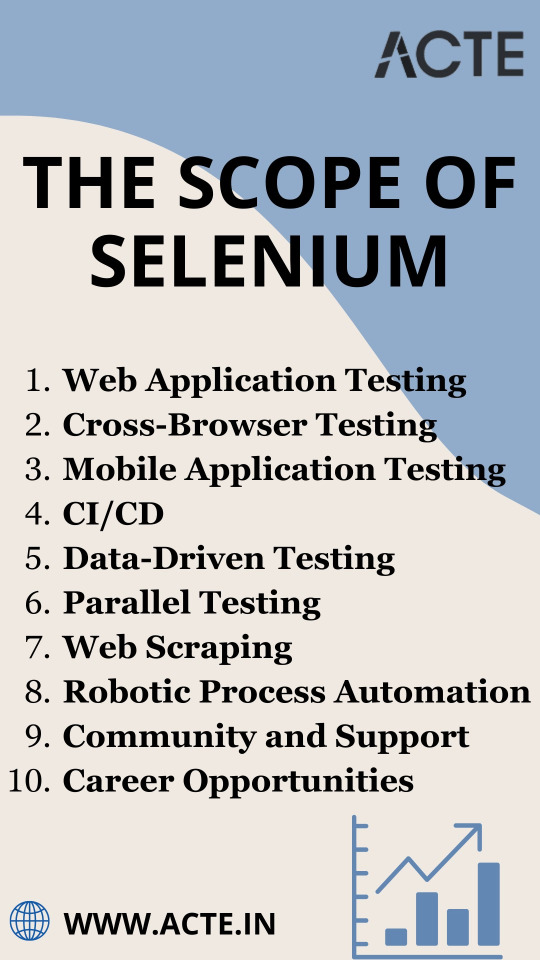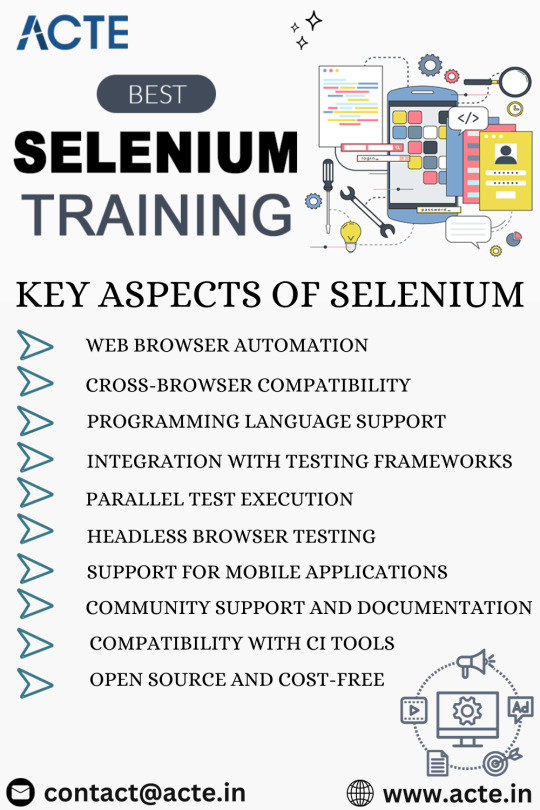#Appium automation testing
Explore tagged Tumblr posts
Text
[Learning logs - Appium] Lịch sử phát triển
Appium project history Appium ra đời khoảng năm 2012, dưới thời của các cá nhân và tổ chức khác nhau, đến nay đã phát triển trên 3 ngôn ngữ. Bài này nói về lịch sử Appium. Continue reading [Learning logs – Appium] Lịch sử phát triển
0 notes
Text
The rise of new-age applications and ongoing competitions makes it extremely crucial for apps to up-to-date and provide top-notch quality. To ensure that, organizations must meticulously test the apps before every release.
Having said that, manual testing can be time-consuming and that’s where automation testing jumps in. And various automation tools like Appium, Cypress, etc can provide effective results.
This article dives deep into the world of Appium and Cypress, discovering whing reigns supreme. So, without further ado, let’s begin!
0 notes
Text

Qicon Provides selenium automation testing Course Training with real time project .We also provide interview questions for selenium with java online training.
#selenium#softwaretesting#seleniumwebdriver#automationtesting#seleniumtraining#testing#seleniumwithjava#manualtesting#java#testautomation#apitesting#python#automation#seleniumautomation#appium#softwaretester#onlinelearning#javatraining#mobileapptesting#webapptesting#applicationtesting#ittrainingcentres#seleniuminstitute#loadrunner#training#onlinetraining#softlogicsystems#qiconinstitue#instituteinhyderabad#instituteinammerpet
0 notes
Text

0 notes
Text
How to Integrate Testing Automation Tools into Your CI/CD Pipeline
Integrating testing automation tools into your Continuous Integration/Continuous Deployment (CI/CD) pipeline is crucial for enhancing software quality and accelerating delivery cycles. The first step is to select the right automation tool that aligns with your technology stack and project requirements. Popular choices include Selenium for web applications, Appium for mobile apps, and JUnit for Java-based projects.
Once the tool is chosen, configure your CI/CD pipeline to include automated testing at various stages. Begin with unit tests during the build phase to catch issues early. Tools like Jenkins, CircleCI, or GitLab CI can be configured to trigger these tests automatically with each code commit. Ensure that the testing environment mirrors the production setup to achieve accurate results.
Next, integrate automated functional and regression tests in the pre-deployment phase. These tests should validate end-to-end functionalities and ensure that new changes do not break existing features. Using frameworks like TestNG or Cucumber can help manage these tests effectively.
Additionally, incorporate performance and load testing tools like JMeter or Gatling to assess the application's behavior under stress. These tests can be scheduled to run during off-peak hours to avoid interference with regular development activities.
Finally, maintain a robust reporting mechanism to track test results and generate insights. Tools like Allure or TestRail can provide detailed reports and dashboards, facilitating quick identification and resolution of issues.
By strategically integrating testing automation tools into your CI/CD pipeline, you ensure a reliable, efficient, and scalable approach to software delivery, ultimately leading to higher quality products and faster release cycles.
#codeless test automation#codeless testing platform#test automation software#automated qa testing#no code test automation tools
3 notes
·
View notes
Text
A Comprehensive Exploration of Selenium: A Double-Edged Sword in Software Testing
In the ever-evolving realm of software testing, Selenium has emerged as a dual-faced protagonist, offering a spectrum of advantages while presenting unique challenges. This blog takes a deep dive into the intricacies of Selenium, shedding light on both its strengths and potential pitfalls.

Unveiling Selenium's Strengths
Advantages:
Embrace Open-Source Freedom: Selenium's open-source nature liberates users from licensing constraints, fostering a community-driven ecosystem with widespread adoption and support.
Cross-Browser Harmony: Selenium's commendable support for major browsers ensures comprehensive testing, guaranteeing a seamless user experience across diverse platforms.
Multi-Language Versatility: The support for multiple programming languages allows testers to choose their preferred language, enhancing flexibility and catering to diverse project requirements.
Platform-Independent Prowess: Selenium's platform independence enables the creation of test scripts on one operating system and their seamless execution across different platforms, a testament to its adaptability.
Harmony with Testing Frameworks: Selenium's seamless integration with popular testing frameworks fosters structured and modular test script development, promoting organization and ease of maintenance.
Thriving Community Support: A robust community of developers and testers ensures a constant flow of resources, forums, and plugins, enriching the overall Selenium experience.
Parallel Execution Efficiency: Selenium's ability to execute test scripts in parallel is a time-saving feature, particularly valuable for large test suites and resource optimization.
Mobile Testing Proficiency: Beyond web applications, Selenium extends its support to mobile application testing through frameworks like Appium, making it a versatile choice for organizations engaging in both web and mobile development.

Navigating Selenium's Challenges
Disadvantages:
Navigating Windows Application Limits: Selenium's primary focus on web applications can be limiting for organizations heavily reliant on Windows-based applications.
Mastering the Learning Curve: Selenium demands a certain level of programming proficiency, potentially posing a challenge for individuals with limited coding experience.
Reporting Complexities: The absence of built-in reporting capabilities requires users to rely on third-party tools or custom frameworks, introducing an additional layer of complexity.
Visual Validation Hurdles: The lack of support for image-based testing may limit Selenium's application in scenarios where visual validation is paramount.
Captcha and Barcode Testing Constraints: Selenium faces challenges automating tests involving Captcha or barcode reading, potentially requiring human intervention.
Browser Version Sensitivity: Selenium WebDriver's dependency on browser versions introduces the risk of compatibility issues with script updates or changes in browser versions.
Mobile Testing Setup Complexity: Configuring Selenium for mobile testing across various platforms and devices can be intricate, necessitating additional tools and configurations.
Data Management Challenges: The absence of built-in test data management requires testers to handle data input and output through coding or external data sources.
Striking a Balance with Selenium
In summary, Selenium stands as a dynamic force in software testing, offering a range of advantages coupled with distinctive challenges. Achieving optimal results with Selenium requires a strategic approach, acknowledging both its strengths and limitations. Whether maximizing open-source freedom or addressing mobile testing complexities, organizations can leverage comprehensive training programs to harness Selenium's full potential.
As the software testing landscape evolves, Selenium remains a potent tool, demanding a nuanced understanding to navigate its complexities effectively. This exploration showcases Selenium as a double-edged sword, urging testers and developers to strike a delicate balance for a robust and efficient testing strategy.
2 notes
·
View notes
Text
Exploring the Expansive Horizon of Selenium in Software Testing and Automation
In the dynamic and ever-transforming realm of software testing and automation, Selenium stands as an invincible powerhouse, continually evolving and expanding its horizons. Beyond being a mere tool, Selenium has matured into a comprehensive and multifaceted framework, solidifying its position as the industry's touchstone for web application testing. Its pervasive influence and indispensable role in the landscape of software quality assurance cannot be overstated.

Selenium's journey from a simple automation tool to a complex ecosystem has been nothing short of remarkable. With each new iteration and enhancement, it has consistently adapted to meet the evolving needs of software developers and testers worldwide. Its adaptability and extensibility have enabled it to stay ahead of the curve in a field where change is the only constant. In this blog, we embark on a thorough exploration of Selenium's expansive capabilities, shedding light on its multifaceted nature and its indispensable position within the constantly shifting landscape of software testing and quality assurance.
1. Web Application Testing: Selenium's claim to fame lies in its prowess in automating web testing. As web applications proliferate, the demand for skilled Selenium professionals escalates. Selenium's ability to conduct functional and regression testing makes it the preferred choice for ensuring the quality and reliability of web applications, a domain where excellence is non-negotiable.
2. Cross-Browser Testing: In a world of diverse web browsers, compatibility is paramount. Selenium's cross-browser testing capabilities are instrumental in validating that web applications perform seamlessly across Chrome, Firefox, Safari, Edge, and more. It ensures a consistent and user-friendly experience, regardless of the chosen browser.
3. Mobile Application Testing: Selenium's reach extends to mobile app testing through the integration of Appium, a mobile automation tool. This expansion widens the scope of Selenium to encompass the mobile application domain, enabling testers to automate testing across iOS and Android platforms with the same dexterity.
4. Integration with Continuous Integration (CI) and Continuous Delivery (CD): Selenium seamlessly integrates into CI/CD pipelines, a pivotal component of modern software development. Automated tests are executed automatically upon code changes, providing swift feedback to development teams and safeguarding against the introduction of defects.
5. Data-Driven Testing: Selenium empowers testers with data-driven testing capabilities. Testers can execute the same test with multiple sets of data, facilitating comprehensive assessment of application performance under various scenarios. This approach enhances test coverage and identifies potential issues more effectively.
6. Parallel Testing: The ability to run tests in parallel is a game-changer, particularly in Agile and DevOps environments where rapid feedback is paramount. Selenium's parallel testing capability accelerates the testing process, ensuring that it does not become a bottleneck in the development pipeline.
7. Web Scraping: Selenium's utility extends beyond testing; it can be harnessed for web scraping. This versatility allows users to extract data from websites for diverse purposes, including data analysis, market research, and competitive intelligence.
8. Robotic Process Automation: Selenium transcends testing and enters the realm of Robotic Process Automation (RPA). It can be employed to automate repetitive and rule-based tasks on web applications, streamlining processes, and reducing manual effort.
9. Community and Support: Selenium boasts an active and vibrant community of developers and testers. This community actively contributes to Selenium's growth, ensuring that it remains up-to-date with emerging technologies and industry trends. This collective effort further broadens Selenium's scope.
10. Career Opportunities: With the widespread adoption of Selenium in the software industry, there is a burgeoning demand for Selenium professionals. Mastery of Selenium opens doors to a plethora of career opportunities in software testing, automation, and quality assurance.

In conclusion, Selenium's scope is expansive and continuously evolving, encompassing web and mobile application testing, CI/CD integration, data-driven testing, web scraping, RPA, and more. To harness the full potential of Selenium and thrive in the dynamic field of software quality assurance, consider enrolling in training and certification programs. ACTE Technologies, a renowned institution, offers comprehensive Selenium training and certification courses. Their seasoned instructors and industry-focused curriculum are designed to equip you with the skills and knowledge needed to excel in Selenium testing and automation. Explore ACTE Technologies to elevate your Selenium skills and stay at the forefront of the software testing and automation domain, where excellence is the ultimate benchmark of success.
3 notes
·
View notes
Text
A list of upcoming software testing conferences, software quality assurance and DevOps events taking place in 2023 all over the world (USA, Canada, Europe, UK, Germany, France, Netherlands, India, China, Australia, etc.). These conferences discuss software quality assurance, test automation, open source testing tools, agile testing, Selenium, Appium, Cypress, PlayWright, JMeter, Postman, mobile testing, web testing, load testing, DevOps, continuous delivery or test management.
3 notes
·
View notes
Text
Mobile QA Engineer - SDET
Proficiency in Mobile Testing Tools Comfortable in Android Studio / Xcode and can deploy to a simulator or device. Familiar… in at least one of the following native automated testing frameworks: Appium, XCUI for iOS, UIAutomator for Android Exposure to Test script… Apply Now
0 notes
Text
Mobile QA Engineer - SDET
Proficiency in Mobile Testing Tools Comfortable in Android Studio / Xcode and can deploy to a simulator or device. Familiar… in at least one of the following native automated testing frameworks: Appium, XCUI for iOS, UIAutomator for Android Exposure to Test script… Apply Now
0 notes
Text
[Learning logs - Appium] - Phần 1: Tìm hiểu kiến trúc Appium cùng Hằng Béo
Một buổi trưa nọ, sau khi ăn cơm xong, anh Tèo qua chỗ Hằng béo buôn chuyện: — Hằng này, mày đang đọc cái gì đấy? — Em đang học Appium. Nghe nói dạo này thị trường lao động lại có đợt lọc mem, em tranh thủ học thêm kiến thức để lỡ có bị lọc còn dễ tìm việc — Ờ. Hợp lí đấy. Thế mày tìm hiểu được gì rồi? Continue reading [Learning logs – Appium] – Phần 1: Tìm hiểu kiến trúc Appium cùng Hằng Béo
0 notes
Text
Mastering QA Automation: Top Courses to Boost Your Testing Skills?
Introduction
Software testing and quality assurance play a crucial role in software development. With the increasing demand for robust applications, businesses rely on skilled Quality Assurance (QA) professionals to ensure software meets industry standards. Mastering automation testing can elevate your career, making you a valuable asset in the software industry.
In this guide, we’ll explore some of the best Software testing and quality assurance course to help you build a strong foundation in automation testing. Whether you are a beginner or a seasoned tester, these courses provide comprehensive knowledge and practical insights.
youtube
Why QA Automation Matters
With rapid advancements in technology, businesses aim to deliver software faster without compromising on quality. This is where QA automation comes into play. Here’s why learning automation testing is crucial:
Faster Testing Cycles: Automated tests execute faster than manual testing, improving software release speed.
Higher Accuracy: Eliminates human errors, ensuring precise testing results.
Cost Efficiency: Reduces the need for repetitive manual testing, saving time and resources.
Better Coverage: Automation allows running multiple test cases, covering various scenarios.
Essential Skills for QA Automation
Before diving into the best QA software testing courses, it’s important to understand the core skills you need to succeed in QA automation.
Understanding Software Testing Principles – Knowledge of manual testing, test plans, and test cases.
Programming Basics – Familiarity with programming languages like Java, Python, or JavaScript.
Automation Tools – Experience with Selenium, Appium, JUnit, TestNG, and more.
CI/CD Integration – Understanding of Jenkins, Git, and Docker for continuous testing.
API Testing – Experience with Postman, REST Assured, and SOAP UI.
Performance Testing – Knowledge of JMeter or LoadRunner.
By enrolling in a software quality assurance course, you can gain expertise in these key areas and build a rewarding career in QA automation.
Top QA Automation Courses to Enhance Your Skills
1. Comprehensive QA Automation Training
A well-rounded QA software testing course should cover both manual and automation testing. The course should introduce fundamental concepts and gradually progress to advanced automation techniques.
Key Topics Covered:
Introduction to Software Testing Life Cycle (STLC)
Manual Testing vs. Automation Testing
Selenium WebDriver with Java/Python
TestNG and JUnit Frameworks
Behavior-Driven Development (BDD) with Cucumber
API Testing with Postman and REST Assured
Performance Testing using JMeter
Real-World Application:
Companies like Google and Amazon use Selenium for automation testing. Learning these skills can open doors to various job opportunities.
2. Advanced Selenium WebDriver Training
Selenium is one of the most popular automation tools. This course focuses on advanced Selenium features for robust test automation.
Key Topics Covered:
Selenium WebDriver Architecture
Locators and Web Elements
Handling Dynamic Elements and AJAX Requests
Cross-Browser Testing with Selenium Grid
Integration with Jenkins for CI/CD
Headless Browser Testing
Practical Example:
A banking application needs to test its login functionality across multiple browsers. Selenium WebDriver allows automated execution on Chrome, Firefox, and Edge simultaneously.
3. API Testing and Automation
API testing is a critical part of QA automation. This course teaches how to test RESTful and SOAP APIs effectively.
Key Topics Covered:
Fundamentals of API Testing
Automating API Tests with Postman
REST Assured Framework
Handling JSON and XML Responses
API Security Testing
Real-World Application:
E-commerce platforms extensively use APIs to process payments. API testing ensures seamless transactions across payment gateways.
4. Performance Testing with JMeter
Performance testing ensures applications can handle heavy traffic without crashes. JMeter is widely used for load testing.
Key Topics Covered:
Introduction to Performance Testing
JMeter Test Plan and Thread Groups
Parameterization and Correlation
Stress Testing and Load Testing
Integrating JMeter with CI/CD Pipelines
Case Study:
A social media platform anticipated high traffic during a product launch. Load testing with JMeter helped optimize server capacity.
5. QA Automation with H2K Infosys
H2K Infosys offers an extensive software quality assurance course, covering end-to-end automation testing. Their curriculum is industry-focused, ensuring practical exposure to real-world projects.
Key Topics Covered:
Software Testing Fundamentals
Selenium WebDriver with Java
API and Database Testing
CI/CD Integration
Agile and Scrum Practices
H2K Infosys provides hands-on training and live projects, helping learners gain job-ready skills.
Benefits of Enrolling in a QA Software Testing Course
Industry-Relevant Curriculum: Gain practical insights and hands-on experience with real-world projects.
Certification Opportunities: Earn industry-recognized certifications to boost your resume.
Career Growth: QA automation testers are in high demand with competitive salaries.
Flexible Learning: Online courses offer flexibility to learn at your own pace.
Job Assistance: Some training programs, like those offered by H2K Infosys, provide job placement support.
Choosing the Right QA Automation Course
When selecting a software quality assurance course, consider these factors:
Course Content: Ensure it covers automation testing fundamentals and advanced techniques.
Hands-On Practice: Practical experience is crucial for mastering automation tools.
Instructor Expertise: Choose courses taught by experienced professionals.
Student Reviews: Check feedback to ensure quality training.
Certification Options: Certifications add credibility to your skillset.
Future of QA Automation
The QA industry continues to evolve with advancements in AI and machine learning. Some future trends include:
AI-Powered Testing: AI-driven tools like Testim and Applitools enhance automation efficiency.
Shift-Left Testing: Early testing integration in the development cycle reduces defects.
Codeless Automation: Tools like Katalon and TestComplete enable automation with minimal coding.
Cloud-Based Testing: Scalable cloud platforms improve testing speed and efficiency.
By staying updated with the latest trends, you can remain competitive in the QA automation field.
Conclusion
Mastering QA automation is essential for a successful career in software testing. By enrolling in a well-structured QA software testing course, you can gain in-demand skills and improve job prospects. Courses offered by H2K Infosys provide hands-on training and industry insights to help you excel in automation testing.
Take the next step in your career—enroll in a software quality assurance course today and become a QA automation expert!
0 notes
Text
The Importance of Regression Testing in Agile Development
Agile development is a widely adopted methodology in software engineering that emphasizes flexibility, collaboration, and iterative progress. It follows principles outlined in the Agile Manifesto, such as responding to change over following a plan and prioritizing working software over comprehensive documentation. Agile methodologies, including Scrum and Kanban, enable teams to deliver software in small, incremental cycles known as sprints, ensuring continuous feedback and improvement. This approach enhances adaptability and accelerates time-to-market, making Agile the preferred choice for modern software development.
What is Regression Testing?
Regression testing is a software testing practice that ensures new code changes do not negatively impact the existing functionality of an application. It involves re-running previously executed test cases to confirm that modifications, enhancements, or bug fixes have not introduced new defects. By maintaining software stability and integrity, regression testing plays a crucial role in quality assurance.
Role of Regression Testing in Agile
Agile development involves frequent code changes, updates, and deployments, increasing the risk of introducing unintended issues. Regression testing helps mitigate these risks by:
Ensuring Stability: Validates that recent modifications do not break existing features.
Supporting Continuous Integration (CI): Facilitates early detection of issues when integrated into automated CI pipelines.
Enhancing Confidence: Enables developers to make rapid changes without fear of disrupting functionality.
Improving Collaboration: Provides immediate feedback to developers and testers, streamlining Agile workflows.
Challenges of Regression Testing in Agile
Despite its benefits, implementing regression testing in Agile environments comes with challenges:
Time Constraints: Agile’s short development cycles leave limited time for exhaustive testing.
Resource Limitations: Manual regression testing can be labor-intensive and resource-draining.
Test Maintenance: Frequent updates require continuous revision of test cases to maintain coverage.
Automation Complexity: While automation speeds up testing, it requires initial investment in scripting and tool setup.
Scalability Issues: As the application grows, the test suite expands, leading to longer execution times.
Best Practices for Effective Regression Testing in Agile
To overcome these challenges, teams can adopt the following best practices:
Automate Regression Testing: Use automation tools to execute repetitive test cases efficiently.
Prioritize Test Cases: Focus on high-risk and frequently used functionalities.
Integrate with CI/CD Pipelines: Automate regression testing as part of the CI/CD process to catch defects early.
Optimize Test Suites: Regularly review and remove obsolete test cases to improve efficiency.
Use Risk-Based Testing: Allocate more testing efforts to areas most susceptible to defects.
Leverage Parallel Testing: Run test cases concurrently to reduce execution time.
Tools and Technologies for Regression Testing in Agile
Several tools facilitate regression testing in Agile development, including:
Selenium: Selenium is a widely used automation tool for web applications.
JUnit/TestNG: Popular frameworks for unit testing in Java applications.
Appium: Appium is Suitable for mobile application testing.
Cypress: A modern end-to-end testing framework for web applications.
vStellar: vStellar is a robust testing platform supporting automated regression testing.
Jenkins: An automation server used to integrate testing into CI/CD workflows.
Benefits of Regression Testing in Agile
Effective regression testing in Agile development offers numerous advantages:
Faster Delivery: Detects defects early, reducing rework and enabling rapid releases.
Improved Software Quality: Ensures stability and reliability with every iteration.
Reduced Risks: Prevents new changes from introducing critical failures.
Enhanced Developer Productivity: Provides quick feedback, allowing developers to focus on feature development.
Better User Experience: Delivers a stable and seamless application to end-users.
Conclusion
Regression testing is indispensable in Agile development, ensuring that frequent code changes do not compromise software quality. By incorporating automation, prioritizing critical test cases, and leveraging CI/CD pipelines, Agile teams can maintain software stability while accelerating delivery. In a fast-paced development environment, robust regression testing not only reduces risks but also enhances product reliability, ultimately contributing to the success of Agile projects.
0 notes
Text

0 notes
Text
Selenium Grid: Master Parallel and Distributed Testing

In today's highly-competitive software development environment testing plays a vital part in ensuring that applications are of high quality. Selenium Grid is a powerful tool that facilitates tests that are distributed and parallel and significantly cuts down the time required to test while increasing the coverage. It lets testers run multiple test scenarios across different operating systems and browsers in parallel, thereby making the automation process more efficient and adaptable.
Understanding Selenium Grid
Selenium Grid is component of the Selenium suite of products designed to run tests across multiple environments simultaneously. It is based on a hub-node model that has a central hub which manages several nodes running tests in parallel. This configuration maximizes effectiveness and guarantees full validation across various platforms.
Benefits of Using Selenium Grid
Speedier Test Execution Parallel execution across multiple computers increases the speed of testing.
Cross-Browser and Cross-Platform Test - Tests compatibility by running tests across various operating systems and browsers.
Optimized Utilization of Resources It distributes tests efficiently and makes the most use of the infrastructure available.
Scalability Additional nodes could be added as the testing demands increase.
Integration of CI/CD Integrates effortlessly with Continuous Testing workflows.
How Selenium Grid Works
Central hubs receive tests and assigns them to the connected nodes in accordance with their availability and their configuration. Nodes are able to run tests in different browsers or OS combinations, which allows multiple tests to be executed simultaneously. This helps reduce the total execution time and improves the test coverage.
Best Practices for Selenium Grid
Make sure you have the correct configuration The correct operating system settings and browser version avoid problems.
Utilize Cloud-Based Solutions Platforms like BrowserStack as well as Sauce Labs offer scalable Selenium Grid infrastructure.
Improve parallel execution - Optimize the distribution of tests to reap maximum advantages.
monitor and maintain nodes Regular updates are helpful to prevent compatibility issues.
Challenges and Considerations
The process of setting the Selenium Grid requires technical expertise as well as maintaining multiple nodes can consume a lot of resources. Testing flakiness caused by network latency is another frequent problem. Cloud-based solutions can help alleviate certain of these problems through pre-configured flexible infrastructure.
Conclusion
Selenium Grid is a valuable tool for automating testing, allowing parallel execution and efficient management of resources. It provides more rapid feedback, greater test coverage, and better scaling. If you follow the best methods, teams can benefit from Selenium Grid to streamline their testing processes and guarantee software quality. Learning about Selenium Grid through selenium course online can provide a deeper understanding of parallel and distributed testing for efficient test execution.
FAQ's
1. Can Selenium Grid run tests on different operating systems simultaneously? It is true, Selenium Grid allows you to test across different operating systems simultaneously by connecting multiple nodes running in different OS environments.
2. Is Selenium Grid suitable for mobile testing? Selenium Grid is primarily designed for web-based applications, however it is also compatible in conjunction with Appium to perform automatized tests using mobile devices.
3. How many nodes can be connected to a single Selenium Grid hub? There is no set limit to performance, however it is contingent on the capabilities of the hardware along with network speed, as well as the complexity of tests. A properly optimized grid is able to handle many nodes with ease.
0 notes
Text
Beyond Clicks: Navigating the Landscape of Selenium for Developers
In the dynamic realm of software development, efficiency, and reliability are paramount. Selenium, an open-source framework, has emerged as a powerhouse for automating web browsers and streamlining the testing process. Embracing Selenium's capabilities becomes even more accessible and impactful with Selenium Training in Bangalore. This training equips individuals with the skills and knowledge to harness the full potential of Selenium, enabling them to proficiently navigate web automation challenges and contribute effectively to their respective fields.

Let's dive into the key features and benefits that make Selenium a go-to choice for developers and testers worldwide.
1. Web Browser Automation Simplified
At its core, Selenium is designed to automate web browsers, providing developers and testers with a suite of tools and libraries to script interactions with web elements. From clicking buttons to filling forms, Selenium allows for the programmatic simulation of user actions, significantly enhancing the efficiency of testing processes.
2. Cross-Browser Compatibility at its Core
One of Selenium's standout features is its ability to seamlessly work across different web browsers. Whether it's Chrome, Firefox, Safari, Edge, or others, Selenium ensures that web applications are rigorously tested and perform consistently across various browsers, a crucial aspect in today's diverse online landscape.
3. Versatility Across Programming Languages
Selenium supports a variety of programming languages, including Java, Python, C#, Ruby, and JavaScript. This versatility empowers developers and testers to leverage the language they are most comfortable with, fostering a seamless integration of Selenium into a wide range of development environments.
4. Integration with Testing Frameworks
Selenium effortlessly integrates with popular testing frameworks like JUnit, NUnit, TestNG, and more. This integration facilitates the creation of structured and maintainable test suites, enhancing the organization and execution of tests within the development workflow.
5. Parallel Test Execution for Efficiency
Selenium supports parallel test execution, enabling multiple tests to run simultaneously. This feature is a game-changer, significantly reducing testing time and optimizing resource utilization, especially in scenarios where efficiency is paramount.
6. Headless Browser Testing for Practicality
Selenium's support for headless browser testing allows tests to run without a graphical user interface. This is particularly valuable for scenarios where running a full browser is impractical or unnecessary, providing practical solutions for different testing needs.
7. Mobile Application Automation with Appium Integration
Beyond web applications, Selenium extends its capabilities to automate mobile applications through frameworks like Appium. This holistic approach enables end-to-end testing of both web and mobile applications, creating a unified testing solution.
8. Community Support and Robust Documentation
Selenium boasts a vibrant and active community that contributes to extensive documentation, tutorials, and forums. This community-driven support system ensures that users can easily seek help, share knowledge, and stay updated on the latest developments in Selenium.
9. Seamless Integration with Continuous Integration Tools
Selenium integrates seamlessly with popular Continuous Integration (CI) tools like Jenkins and Travis CI. This compatibility allows for the smooth incorporation of automated testing into the continuous integration and delivery pipelines, aligning with modern development practices.
10. Open Source and Cost-Free Advantage
Perhaps one of Selenium's most compelling features is its open-source nature. Being open source and free to use, Selenium eliminates financial barriers, making it accessible to a broad audience. The collaborative nature of Selenium's community ensures ongoing development and support for its users.

In conclusion, Selenium stands as a powerful and versatile framework that empowers developers and testers to automate web browsers and streamline testing processes. Its cross-browser compatibility, support for multiple programming languages, and integration with testing frameworks make it a cornerstone in the world of web automation. Whether you're a seasoned developer or a testing enthusiast, Selenium's capabilities, coupled with its open-source nature and vibrant community, make it an invaluable tool in the pursuit of efficient and reliable software development. To unlock the full potential of Selenium and master the art of web automation, consider enrolling in the Best Selenium Training Institute. This training ensures that individuals gain comprehensive insights, hands-on experience, and practical skills to excel in the dynamic field of web testing and automation.
3 notes
·
View notes